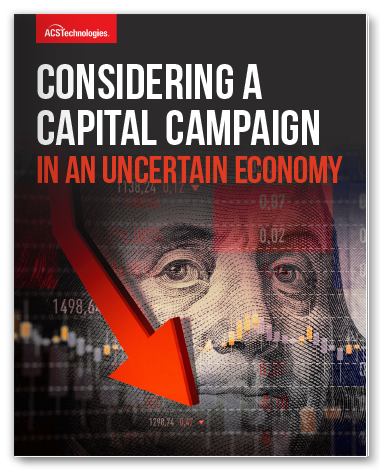Part 2 of 4
Many churches and organizations have delayed their capital campaign plans due to the uncertainty created by the pandemic and now the challenges of the economy. It can feel like record-high inflation, and stock market volatility are good reasons to keep kicking the can of a campaign launch down the road.
But don’t give up yet. This blog series is designed to help provide assessments and guideposts as you visit – or re-visit – the notion of launching a capital campaign for a much-needed project. In our first blog, we stressed the importance of conversations: Seeking advice and counsel from members of your congregation and your major donors.
Step two is shoring up your current financial health.
A campaign is a drag on any organization’s overall staff bandwidth and budget. If your current operating budget and annual stewardship revenues are uncertain, focus on those core foundations first. Especially in light of price increases and investment values dipping, pay close attention to your annual expenses and revenues. In past blogs and videos, we’ve offered many great practices and tips for ensuring your day-to-day church fundraising operation is serving donors well. But that has to be a priority before undertaking a major campaign.
If your core operating budget is shored up and your donors are happy, meaning they know their impact and feel thanked and valued), turn your attention to the project need.
Step three is exploring options and getting creative with your approach and timing.
Is there a way to complete the project in phases over time? Or a way to finish or shell a portion of the space or building and use a second campaign or other financings to complete it? Will a financial institution or private lender make a loan with unique terms – or forgive a loan over time, taking the tax credit then?
Can you raise the funds in phases? Is a donor willing to make his/her campaign commitment a match to encourage others to give or pledge within a specific timeframe? Are there any earned-revenue components to this project that could assist in recovering costs? Is there a grant or foundation that funds projects like this, or would be willing to do a challenge match to motivate other donors?
Look closely at the project budget and slice and dice it with some industry professionals and creative minds in your congregation. Use those brainstorming sessions to generate passion for the project. The more members who are bought into the vision, the more likely the right resources will come together, as God will move in the hearts of those who could be partners in making it happen. Be flexible and willing to tackle the project over time or in ways you hadn’t considered.
As you complete these steps, the hard truth might be that this isn’t the right time, even if it’s the right project. In the next blog of this series, we’ll talk about what to do when the answer to the question of launching a campaign is “not now.”
Launching a Capital Campaign in a Turbulent Economy
It can feel like record-high inflation, and stock market volatility are good reasons to keep kicking the can of a campaign launch down the road. And it’s true: Many churches and organizations have delayed their capital campaign plans due to the pandemic and now with the challenges of the economy.
But don’t give up yet. These concrete steps will help you assess how to best prepare for and launch a capital campaign for a much-needed project despite the current economic uncertainties.
For more information on consulting for Capital Campaigns, visit ACST’s Consulting pages.
Tim has over 30 years of experience in Church, Non-Profit Administration, Management, and Fund Development. Serving as an Executive Pastor and Chief Development Officer in growing Churches and Non-Profit Organizations. He has provided a wide range of expertise and resources. Tim serves as the Founder and CEO of Non-Profit DNA. A boutique firm committed to helping nonprofits and churches. By building their capacity through fundraising, leadership, team building, staff recruiting, and coaching.





